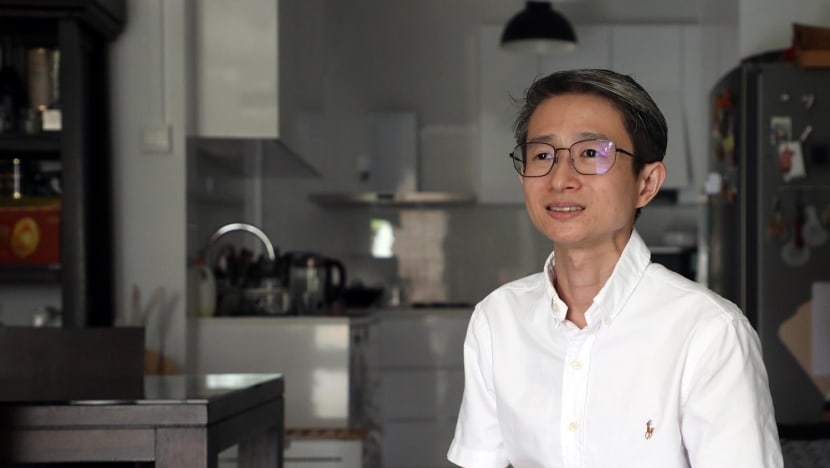‘But he’s a guy’: Singaporean pancreatic cancer patient in his 30s tests positive for mutated gene linked to breast cancer

Mr Lester Ng (pictured) was treated for a rare condition called heterotopic pancreas, where pancreatic tissue located within his stomach had turned cancerous.
SINGAPORE — Like many career-driven young adults, Mr Lester Ng led a hectic lifestyle while working in the finance sector.
In 2018, he got a job promotion and was stationed overseas. His daily routine often involved working long hours and there were regular drinking sessions with friends and colleagues.
With his sole focus on surviving the corporate jungle at the time, Mr Ng did not expect that he would soon be fighting for his life.
A persistent bout of stomach pains, which he initially thought was “just gastric”, turned out to be a rare form of advanced pancreatic cancer.
He was 32 at the time.
Mr Ng spent the next year getting treated for the disease, permanently losing two-thirds of his stomach, 10kg and his ability to think clearly due to the side effects of treatment.
In conjunction with National Cancer Survivors Month in June, which recognises individuals who had cancer and emerged as survivors, Mr Ng, now 37, spoke to TODAY to raise awareness on how patients cope after a cancer diagnosis.
Worldwide and in Singapore, more people are being diagnosed with cancer. The latest figures domestically from the Singapore Cancer Registry showed that 80,753 people were diagnosed with cancer between 2016 and 2020, higher than the 71,265 between 2013 and 2017.
Recalling the first thing he said to the doctor after learning about his diagnosis, Mr Ng, who underwent treatment at the National Cancer Centre Singapore (NCCS), said: “My first question was, ‘What’s a pancreas?’ I was no biology student — I had always been mathematically inclined.
“The next question was, ‘What did my pancreas have to do with my gastric pains since the stomach and pancreas were not the same thing?’”
The pancreas is an organ located in the abdomen that helps regulate blood sugar and helps with digestion. It is tucked under the liver and close to other organs such as the gallbladder, stomach and small intestine.
Mr Ng had a rare condition called heterotopic pancreas, but he was not aware of it.
Instead of the usual location of the pancreas, pancreatic tissue is found elsewhere in the gastrointestinal tract. This happens during the person’s growth and developmental process.
In Mr Ng’s case, the heterotopic pancreas tissue located within his stomach had turned cancerous.
Clinical associate professor David Tai Wai Meng from NCCS described heterotopic pancreatic cancer as “extremely rare”, and the centre does not have figures on the cases it sees.
Assoc Prof Tai is a senior consultant with NCCS’ division of medical oncology.
In general, pancreatic cancer is the 10th most common cancer in both men and women in Singapore.
The cancer is most often diagnosed in older adults aged 60 to 80, Assoc Prof Tai said, although data from overseas has found an increase in incidences of pancreatic cancer in younger age groups. Further studies are needed to investigate why this is occurring.
It is not known what causes pancreatic cancer to develop.
However, several factors have been found to play a role, Assoc Prof Tai said. They are:
- Age, particularly those above 70
- Smoking
- Obesity
- Chronic inflammation of the pancreas (known as pancreatitis)
- A family history of pancreatic cancer
- Inherited syndromes such as the BRCA2 gene mutation, Lynch syndrome and Familial Atypical Multiple Mole Melanoma syndrome
While not all risk factors can be controlled, there are some ways to lower the risk, such as avoiding smoking or inhaling second-hand smoke, limiting alcohol consumption, maintaining a healthy diet and healthy weight.
‘BREAST CANCER GENE’ IN MEN
Despite having no strong family history of cancer, Mr Ng underwent genetic counselling (see sidebar at end of report) at the Cancer Genetics Service of NCCS.
“I think anyone who falls sick would wonder why. I was looking for the root cause. Was it because I drank too much (alcohol)? Was it due to stress? I was told genetics may be able to provide some clues, so I went for it,” he said.
He learnt that he carried a faulty BRCA2 gene. BRCA is an abbreviation for “breast cancer”.
The BRCA1 and BRCA2 genes have made headlines in recent years, after some high-profile celebrities who tested positive for the mutated gene underwent surgery to remove their breasts as a pre-emptive measure against cancer, such as Hollywood actress Angelina Jolie.
I was not expecting that at all because everyone in the family is perfectly fine. My paternal grandmother lived till she was 92... And when I learnt that it was the breast cancer gene, everyone I know said, ‘But he’s a guy’.
For Mr Ng, the results from genetic testing was a shock.
“I was not expecting that at all because everyone in the family is perfectly fine. My paternal grandmother lived till she was 92,” he said.
“And when I learnt that it was the breast cancer gene, everyone I know said, ‘But he’s a guy’.”
His younger brother and sister both tested negative for the gene mutation.
The BRCA2 gene mutation is often associated with women and breast cancer.
Assistant Professor Chiang Jianbang, a consultant at NCCS’ Cancer Genetics Service, said that men with the faulty gene has an increased risk of developing certain cancers, too. They include male breast cancer, prostate cancer, certain types of skin cancer (melanoma) as well as pancreatic cancer.
NO OBVIOUS SYMPTOMS IN EARLY STAGES
Although cancer survival rates have improved over the years, pancreatic cancer continues to be one of the more deadly cancers here.
It is the fifth most fatal cancer in males and fourth most fatal cancer in females.
A reason is because the cancer is typically caught only at a later stage — just one out of five pancreatic cancers are diagnosed in the early stages when it can be surgically removed, Assoc Prof Tai said.
“Pancreatic cancer is considered challenging because symptoms may not be felt until the cancer is advanced, which means medical treatment is not sought until treatment options are limited,” he explained.
“The close proximity of the pancreas to major blood vessels and other important organs also makes treatment challenging.”
Even for those eligible for surgery, Assoc Prof Tai said that the five-year survival rate after surgery is about 20 per cent. For advanced pancreatic cancer, the median survival rate is around three to six months from diagnosis without treatment, he added.
Even though there may be no obvious symptoms in the early stages, a cancerous growth that blocks the pancreatic duct would prevent digestive enzymes from being released into the intestine and lead to some symptoms such as indigestion, bloating and oily bowel movements.
“If a growth blocks the bile duct, the person could have jaundice (yellowing of the skin and whites of the eyes). Other potential symptoms include unexplained weight loss, abdominal pain, nausea and a loss of appetite,” Assoc Prof Tai said.
Many of the symptoms are similar to that of other common digestive problems.
Assoc Prof Tai suggested seeking medical help early and undergoing checks and blood tests, as advised by the doctor, if you are experiencing any of the symptoms.
BRAIN FOG, SIDE EFFECTS
Mr Ng underwent surgery and chemotherapy as part of his cancer treatment. As the cancerous tissues were found within the stomach, about two-thirds of his stomach was surgically removed.
With a smaller-than-usual stomach size, he can no longer take regular portions of food at meal times.
Chemotherapy left him with nasty side effects and he lost about 10kg.
“Nausea, vomiting, loss of appetite, weakness, brain fog — I probably had almost all of the bad side effects, maybe except severe hair loss. However, my black hair dropped out and only the white hair remained,” he said.
I couldn’t see into the future — no working towards a future, towards a salary increment or anything. You’re just trying to ‘don’t die’ and even not dying seemed like a difficult goal at the time.
The worst side effect for him was the brain fog.
“I was not able to process what people were telling me. I think it was the worst thing for me because I lost a big part of my independence.
“There was nothing much I could do about it except to wait for it to clear. It got better after chemotherapy ended.”
Assoc Prof Tai said that treatment for pancreatic cancer depends on the size, type and location of the tumour, the stage of the disease and the patient’s general health.
For pancreatic cancer that has not spread, the main treatment is surgery. Some may also require other treatments such as chemotherapy and radiation therapy.
Mr Ng, who is not married, said that he would not have been able to cope with the treatment without love and support from his parents, extended family, friends, boss and colleagues. His boss would call him every few weeks to check on him.
“I have a large extended family, and my relatives took turns to pop by every week. It was hard for me to think about the future at the time, but I recall having something to look forward to when I knew my uncles and aunties were coming over.”
He added: “I couldn’t have gotten well without the people around me.
“No matter how independent I was (before treatment), I was at a stage where the illness had taken away most of that independence.
“I couldn’t see into the future — no working towards a future, towards a salary increment or anything. You’re just trying to ‘don’t die’ and even not dying seemed like a difficult goal at the time.”
'WORK IS JUST ONE PART OF LIFE'
After completing treatment in June 2020, Mr Ng returned to work. The brain fog made it tough at first but the symptoms gradually improved.
Now on follow-up care with a multi-disciplinary team at NCCS, Mr Ng took on an expanded job scope when he felt fitter.
He now works as an assistant vice-president in corporate real estate in a bank. He is also in the midst of completing a master’s degree programme in corporate real estate.
Having always taken his work seriously, his brush with death has not changed that.
What has changed however, is his perspective and way of coping with stress.
“I used to get frustrated and impatient easily and was always stressed about some things. I think when we try to do well at work, we try to push very hard for things,” he said.
“This adds to a lot of stress because you put in extra effort and you have more expectations of yourself. I think what has changed is that I’m a bit more accepting that there is only so much I can do.
“Ultimately, work is just one part of life. The people around you are important. I’ve my family, friends. I have a girlfriend right now, so I spend time with her.”
Getting to know other cancer patients and survivors also made him more empathetic towards people who do not share his point of view.
“Everyone has their own struggles and things they are concerned about. Not everyone is, by default, fighting for a promotion. Some people just want to earn a living to pay off their mortgage, take their kids to Sentosa for an outing, for example. But you still need to get the work done, lah,” he added.
As a way to repay the kindness and support that he received when he was ill, Mr Ng joined the NCCS BRCA Support Group, which was formed early this year and led by NCCS’ medical social workers.
He is the only male member in the support group for now. The support group is open to NCCS and non-NCCS patients who have the BRCA gene mutation, as well as their caregivers.
By sharing his experience, he hopes to help other patients feel less alone and more equipped to manage their illness.
Mr Ng emphasised that having a strong support network was integral to his recovery.
“Reach out to your friends and family first. But I recognise that not everyone has (a supportive social network). If you don’t, join a support group. There are people who have gone through the same thing and are willing to share and listen.”
To join the NCCS BRCA Support Group, call 6306 1777 or email patientsupport [at] nccs.com.sg.
GENETIC TESTING: WHO SHOULD GO FOR IT?
Assistant Professor Chiang Jianbang from National Cancer Centre Singapore said that genetic testing is recommended for people with a strong family history of cancers. This applies to both males and females.
Typically, it involves a one-time blood test.
If a blood sample cannot be taken, other ways such as a saliva or skin sample may be explored.
In general, individuals or those with family members who meet any of the following criteria can consider genetic counselling:
- People diagnosed with cancer at a young age
- People diagnosed with more than one primary cancer
- People diagnosed with rare tumours or cancers (for example, pheochromocytomas, adrenocortical carcinomas)
- Multiple people diagnosed with similar types or patterns of cancer on either side (paternal or maternal) of the family
If there is no family history of cancer, genetic testing may also be offered in some cases because a family history of cancer may be affected by factors such as:
- Adoption or lack of genealogical information
- Small family structure
- Male-dominant family
- Family members who are carriers but do not develop cancer











